Former Prime Minister Owen Arthur has called for swift action to resolve funding issues at The University of the West Indies (The UWI).
During his hour-long presentation at the Cave Hill Campus’ Alumni Symposium this past weekend, Arthur called on regional governments to find new, creative, sustainable funding methods for the university.
“The factor that stands in the way of the institution maintaining its record for quality tertiary education is the financial crisis it faces. This is a crisis of such massive proportion that it requires the deployment of a new and the most creative response to ensure its early resolution,” Arthur said.
“At the core of the crisis is the arrears owed to it by the governments it serves and funding arrangements that have generated a liquidity crisis that has made it difficult for the institution to honor its obligations and plan its orderly and viable development in a coherent manner.”
The former Prime Minister said due to the rapid growth in enrollment, governments are having difficulties honoring their commitments, and the payments they make are nowhere close to the invoiced amount.
“With the rapid growth of enrollment, the bills to the governments have escalated and given their own fiscal challenges some governments of the region have increasingly found it difficult to honour the amount for which they have been invoiced. Indeed, rather than honour their bills in full, some governments have resorted to giving The UWI block grants which are less than the invoiced amount,” said the recently appointed Professor.
“The institution is in no position to write off the arrears nor to provide significant cuts on the arrears since it does not have reserves or retained earnings. It also cannot persist with the current funding model which also serves to perpetuate and in fact to deepen its preexisting precarious financial position.”
Meanwhile, the former Prime Minister said Barbadians have not been saving towards tertiary education because they always expected it to remain government-funded.
“We have to begin to see tertiary education as an investment and people save to make investments and that has to be the paradigm shift that comes about,” he said. – Barbados TODAY




